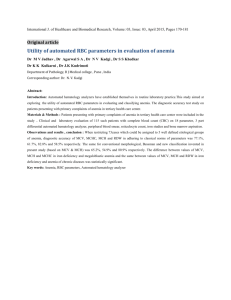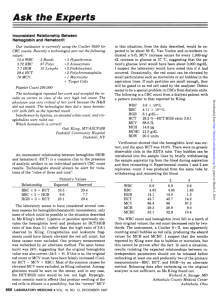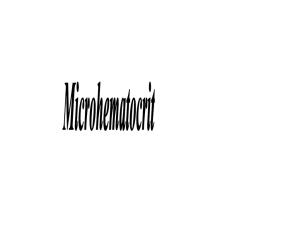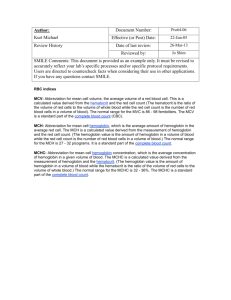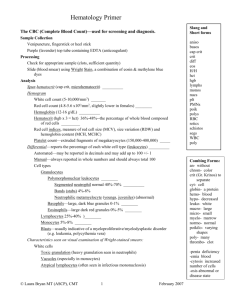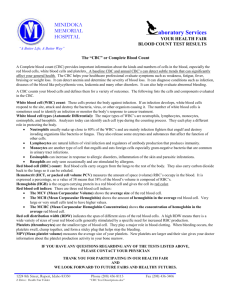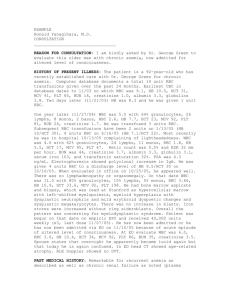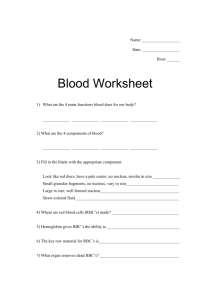Hematology PowerPoints
advertisement
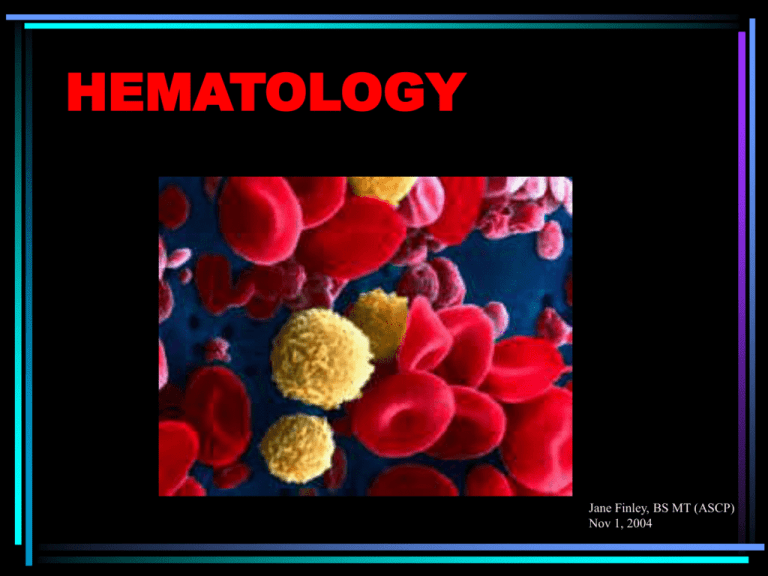
HEMATOLOGY Jane Finley, BS MT (ASCP) Nov 1, 2004 HEMATOLOGY AND LAB LANGUAGE • • • • • • Blood Serum Plasma Erythrocytes (RBC) Granulocytes (WBC) Platelets (Plt) Lab Language: Hematology Testing • • • • • • • • Complete Blood Count (CBC) Erythrocyte Sedimentation Rate (ESR) Sickle Cell Screening Hemoglobin Electrophoresis Ferritin Iron Total Iron Binding Capacity (TIBC) Transferrin Lab Language : CBC • • • • • • • • • Hemoglobin Hematocrit RBC WBC Plt ct RDW MCV MCH MCHC • • • • • • • Segmented Neutrophil Lymphocyte Monocyte Eosinophil Basophil Reticulocyte Reticulcyte Production Index (RPI) Complete Blood Count • • • • • • • • White Blood Count (WBC) Red Blood Cell Count (RBC) Platelet Count (Plt) Hemoglobin (Hb or Hgb) Hematocrit (Hct) Red Cell Indices (MCV,MCHC,MCH) Red Cell Distribution Width (RDW) Differential Count (Diff) CBC Differential -WBC • • • • • Segs Lymphs/Atypical Mono’s Eo’s Baso’s • • • • • Bands Metamyelocyte Myelocyte Promyelocyte Blast CBC Differential-RBC • • • • • • • • Anisocytosis Microcytes Macrocytes Nucleated RBC Howell Jolly Bodies Basophilic Stippling Hypochromia Riticulocytes • • • • • Poikilocytosis Teardrop Ovalocytes Helmet cells Sickle Cells Cell Counts: Number of cells per liter of whole blood WBC 4.5-11.0 x 109/L RBC Males: 4.3-5.7 x1012/L Females: 3.8-5.1 “ Plt 150-400 x109/L Terms Leukocytosis Erythrocytosis Erythropenia Thrombocytosis Thrombopenia Hemoglobin • • • • • Heme + protein (globulin) Main purpose is to carry O2 Three main types Variants result in identifiable disorders Normal ranges are age and gender related Hematocrit • Packed Cell Volume • Measures what percentage of whole blood is represented by RBC • Compares RBC and hemoglobin • Normal ranges are age and gender related Lab Language: Red Cell Indices • MCV- Mean Corpuscular Volume • MCH-Mean Corpuscular Hemoglobin • MCHC-Mean Corpuscular Hemoglobin Concentration • RDW-Red Cell Distribution Width Mean Corpuscular Volume (MCV) The average size (volume) of an RBC. MCV (in fL) = (hematocrit x 10) (rbc count [in millions/µL]) Normal values: 80-100 fL The MCV is a useful tool in the differential diagnosis of anemia Mean Corpuscular hemoglobin (MCH) The average hemoglobin content of a RBC. Normal values: 26-34 pg. MCH (in pg) = hemoglobin x 10 rbc count Mean Corpuscular Hemoglobin Concentration (MCHC) The percentage of a RBC's volume which contains hemoglobin. Normal values: Usually between 31-37%. MCHC may be decreased with severe iron deficiency anemia. MCHC [in g/dL] = hemoglobin [in g/dL] hematocrit [in L/L] RED CELL DISTRIBUTION WIDTH (RDW) • Degree of Red Cell size variability in a blood sample • Coefficient of variation of the size of the RBCs • Expressed as % • Derived from automated instruments that can directly measure the MVC • Normal: 11-15 % Using the RBC Indices • MCV reveals the average size of the RBCs • RDW reveals a variation in size among the RBCs • MCHC reveals how much of the cell is being taken up by hemoglobin • Together can reveal anemia or physiologic disorders that affect quality of life Lab Language: Indices • • • • • Anemia Microcytic Macrocytic Hypochromic normochromic ERYTHROCYTOSIS • Polycythemia vera • Secondary Polycythemia -COPD -Inappropriate stimulation of erythropoietin, such as tumors • Relative Polycythemia -dehydration, -severe burns ERYTHROPENIA (ANEMIA) • Anemias - may result from: – chronic or acute blood loss – decreased synthesis – increased destruction or decreased survival • dilutional effect: – postural (lower in recumbent position) – overhydration Anemia Classifications • Microcytic, hypochromic • Microcytic, normochromic • Normocytic, normochromic • Macrocytic, normochromic NORMOCYTIC, NORMOCHROMIC ANEMIA • MCV normal • MCHC normal • Examples: – acute blood loss – aplastic anemia – most leukemia's – bone marrow infiltration MICROCYTIC, HYPOCHROMIC ANEMIA • MCV decreased • MCHC decreased • Examples: – iron deficiency – thalassemia – lead poisoning – anemia of chronic disease MICROCYTIC, NORMOCHROMIC ANEMIA • MCV decreased • MCHC normal • Examples: –mid-stage iron deficiency –thalassemia MACROCYTIC, NORMOCHROMIC ANEMIA • MCV increased • MCHC normal • Examples: – folate deficiency – vitamin B12 deficiency – pernicious anemia Hemoglobin & Hematocrit Normal Ranges • Cord blood: - Hb - 16.5 ± 3 g/dl - Hct - 51 ± 9 % • 0.5-2 years: - Hb: 12.0 ± 1.5g /dl - Hct - 36 ± 3 % • 12-16 yrs: Female: -Hb 14.0 ± 2 g/dl -Hct 41 ± 4% Male: -Hb 14.5 ± 1 g/dl - Hct 43 ± 6% Hemoglobin & Hematocrit Adult Normal Ranges – Male: Hb 15.5 ± 2 g/dl Hct 47 ± 6% –Female: Hb 14.0 ± 2 g/dl Hct 41 ± 5% RULES OF THREE • Used for quality control • Hb X 3 = Hct ± 3% • RBC X 3 = Hb • Hct X 100,000 = RBC Complete Blood Count • • • • • • • • White Blood Count (WBC) Red Blood Cell Count (RBC) Platelet Count (Plt) Hemoglobin (Hb or Hgb) Hematocrit (Hct) Red Cell Indices (MCV,MCHC,MCH) Red Cell Distribution Width (RDW) Differential Count (Diff) CBC 1 RBC 5.25 x 10[12]/L HGB 15.4 g/dL HCT 46.1 % MCV ______ MCH _____ MCHC ______ RDW _____ CBC 1 RBC 5.25 x 10[12]/L HGB 15.4 g/dL HCT 46.1 % MCV 87.9 fL MCH 29.3 pg MCHC 33.4 g/dL RDW 12.2 CBC 1 CBC 2 RBC HGB HCT MCV MCH MCHC RDW 3.71 x 10[12]/L 5.9 g/dL 20.9 % ______ ______ ______ ______ CBC 2 RBC HGB HCT MCV MCH MCHC RDW 3.71 x 10[12]/L 5.9 g/dL 20.9 % 56.2 fL 15.9 pg 28.3 g/dL 20.2 CBC 2 CBC 3 RBC HGB HCT MCV MCH 3.36 x 10[12]/L 10.9 g/dL 31.2 % _______ ________ MCHC ________ CBC 3 RBC HGB HCT MCV MCH MCHC 3.36 x 10[12]/L 10.9 g/dL 31.2 % 92.8 fL 32.4 pg 34.9 g/dL CBC 3 CBC 4 RBC HGB HCT MCV MCH MCHC RDW 1.26 x 10[12]/L 5.7 g/dL 16.3 % ________ ________ ________ 18.1 CBC 4 RBC HGB HCT MCV MCH MCHC 1.26 x 10[12]/L 5.7 g/dL 16.3 % 130 fL 45.2 pg 34.9 g/dL CBC 4
